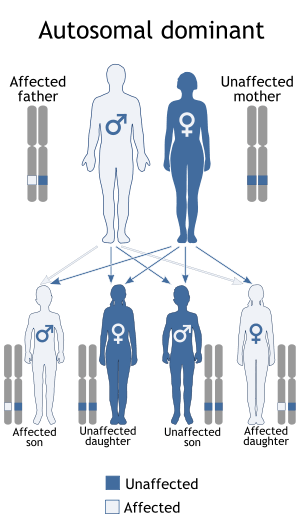Naegeli–Franceschetti–Jadassohn syndrome
| Naegeli–Franceschetti–Jadassohn syndrome | |
|---|---|
| Classification and external resources | |
| OMIM | 161000 |
| DiseasesDB | 29767 |
| eMedicine | derm/736 |
Naegeli–Franceschetti–Jadassohn syndrome (NFJS), also known as chromatophore nevus of Naegeli and Naegeli syndrome,[1][2] is a rare autosomal dominant[3] form of ectodermal dysplasia, characterized by reticular skin pigmentation, diminished function of the sweat glands, the absence of teeth and hyperkeratosis of the palms and soles. One of the most striking features is the absence of fingerprint lines on the fingers.
Naegeli syndrome is similar to Dermatopathia pigmentosa reticularis,[4] both of which are caused by a specific defect in the keratin 14 protein.
Cause and Genetics

NFJS is caused by mutations in the keratin 14 (KRT14) gene, located on chromosome 17q12-21.[3][5] The disorder is inherited in an autosomal dominant manner, which means that the defective gene responsible for a disorder is located on an autosome (chromosome 17 is an autosome), and only one copy of the defective gene is sufficient to cause the disorder, when inherited from a parent who has the disorder.
Eponym
It was named after Oskar Nägeli.[6]
See also
References
- ↑ James W, Berger T, Elston D (2005). Andrews' Diseases of the Skin: Clinical Dermatology (10th ed.). Saunders. p. 548. ISBN 0-7216-2921-0.
- ↑ Online Mendelian Inheritance in Man (OMIM) 161000
- 1 2 Lugassy, J; Itin, P; Ishida-Yamamoto, A; Holland, K; Huson, S; Geiger, D; Hennies, Hc; Indelman, M; Bercovich, D; Uitto, J; Bergman, R; Mcgrath, Ja; Richard, G; Sprecher, E (Oct 2006). "Naegeli-Franceschetti-Jadassohn syndrome and dermatopathia pigmentosa reticularis: two allelic ectodermal dysplasias caused by dominant mutations in KRT14". American Journal of Human Genetics. 79 (4): 724–30. doi:10.1086/507792. PMC 1592572
 . PMID 16960809.
. PMID 16960809. - ↑ Schnur R, Heymann W (1997). "Reticulate hyperpigmentation". Semin Cutan Med Surg. 16 (1): 72–80. doi:10.1016/S1085-5629(97)80038-7. PMID 9125768.
- ↑ Online Mendelian Inheritance in Man (OMIM) 148066
- ↑ synd/1417 at Who Named It?